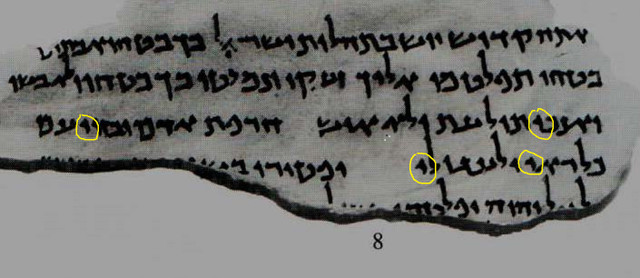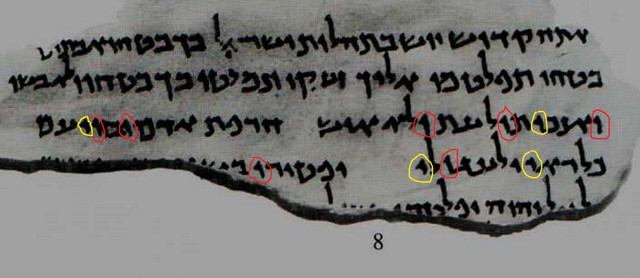Fragment 8 with final Yods highlighted:

Joseph
Review of Fundamentals of New Testament Textual Criticism by Stanley E. Porter and Andrew W. Pitts


Psalm 22:14 also says: "And all My bones are out of joint".kennethgreifer wrote:In Psalm 22:7, the writer says he is a worm and not a man.
...he felt like a worm which does not have hands, feet,
On the sixth pass the crowd looked on in awe, as the bull gored a furrow of blood down the matador's arm and took away part of his sleeve on the end of its horn...
Waiting On Nothing , Catfish McDaris - 2012
Bulls' horns attack by "piercing".A bull's horn pierced his lung and heart as he was trying to help ... man was gored in the chest and a 24-year-old Spanish man in the arm
thesource.com/2016/07/10/ Jul 10, 2016
What utter raving tendentious bovine dust. You cannot help but insinuate your conclusion-driven nonsense. This is unbecoming behavior.rakovsky wrote:It is part of normal speech to say that a beast or predator can dig out body parts with its horns or vicious jaws.
Hello, Spin.spin wrote:Pardon the reality break...You cannot help but insinuate your conclusion-driven nonsense.rakovsky wrote:It is part of normal speech to say that a beast or predator can dig out body parts with its horns or vicious jaws.
Nowhere does it explicitly say word for word that the enemies "attack" or "crush" the narrator's limbs. So this word and concept is inferred by the Artscroll Tanakh and by Rashi, inference being a common part of translation and commentary.iskander wrote:http://www.chabad.org/library/bible_cdo ... rashi=trueRashi , like a lion, my hands and feet: As though they are crushed in a lion’s mouth, and so did Hezekiah say (in Isa. 38: 13): “like a lion, so it would break all my bones.”
The Artscroll English Tanach.22:17
for dogs* have surrounded me; a pack of evildoers has enclosed me, like a lion [ they attack] my hands and my feet.
Repetitive drivel that shows no knowledge of Hebrew is yet a further waste of the forum's attention. You don't know what is required of you to explicate the Hebrew material and you keep demonstrating the fact.rakovsky wrote:Hello, Spin.spin wrote:Pardon the reality break...You cannot help but insinuate your conclusion-driven nonsense.rakovsky wrote:It is part of normal speech to say that a beast or predator can dig out body parts with its horns or vicious jaws.
Inferring terms and using the most relevant synonyms in the language into which a translation occurs is a common part of normal translation and commentaries.
The Artscroll Tanakh and Rashi's commentary do this too as Iskander quoted.Nowhere does it explicitly say word for word that the enemies "attack" or "crush" the narrator's limbs. So this word and concept is inferred by the Artscroll Tanakh and by Rashi, inference being a common part of translation and commentary.iskander wrote:http://www.chabad.org/library/bible_cdo ... rashi=trueRashi , like a lion, my hands and feet: As though they are crushed in a lion’s mouth, and so did Hezekiah say (in Isa. 38: 13): “like a lion, so it would break all my bones.”
The Artscroll English Tanach.22:17
for dogs* have surrounded me; a pack of evildoers has enclosed me, like a lion [ they attack] my hands and my feet.
Their idea that the enemies attack the narrator's limbs like a lion's jaws is a correct understanding of the passage, based on vv. 14 and 22 where a lion's jaws are mentions twice.
How do a lion's jaws attack arms and legs? The jaws bite and "pierce" them with their teeth.
Bayou Moon, Ilona Andrews - 2010 "Huge jaws pierced the foam."
The Grandfather Paradox, by Dave Means - Page 4, - 2007 - " the vise-like jaws pierced his neck"
Bulletin - Volumes 4-6 - Page 20, Academia Sinica. Institute of Zoology - 1965 , "jaws pierced the paper and the impression of the lower jaws duplicated that of the first bite".
"Piercing" is the normal, common, correct way of talking about the bite of jaws in English.
Psalm 59 says that the city's enemies are like dogs with swords in their jaws. The bite of the jaws means the attack of swords.
Psalm 22 describes the enemies' weapons as pointed - horns and "the sword". When the enemies attack, they will use pointed weapons.
Attacking with pointed weapons means piercing the object of the attack.
Enemies who attack someone's "arms and legs" with swords and hornlike pointed weapons "pierce" the arms and legs.
"Piercing" is a correct understanding of what the Psalmist is suggesting happened to the narrator as the armed enemies attacked his arms and legs.
Really? If this was Family Feud and the question was 'pick a verb to describe the action associated with a bite' my money is on 'bite' or 'biting.' Survey says ... something like 50+ people would agree. I'm not sure 'pierce' even makes the list. One of those answers where the host deliberately hesitates because the audience knows it's a stinker. Silly argument."Piercing" is the normal, common, correct way of talking about the bite of jaws in English.
In this case it's not simply a mouth biting by itself, but looking for the proper word to describe the blows of enemies with swords and sharp objects.Secret Alias wrote:Really? If this was Family Feud and the question was 'pick a verb to describe the action associated with a bite' my money is on 'bite' or 'biting.' Survey says ... something like 50+ people would agree. I'm not sure 'pierce' even makes the list. One of those answers where the host deliberately hesitates because the audience knows it's a stinker. Silly argument."Piercing" is the normal, common, correct way of talking about the bite of jaws in English.